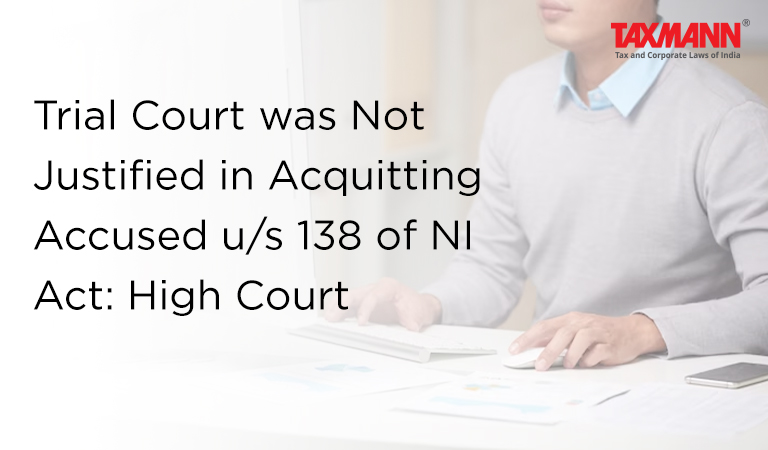Trial Court was Not Justified in Acquitting Accused u/s 138 of NI Act: High Court
- Blog|News|FEMA & Banking|
- 2 Min Read
- By Taxmann
- |
- Last Updated on 5 April, 2023

Case Details: Indranil Mondal v. Birla Corporation Ltd. - [2023] 148 taxmann.com 338 (HC-Calcutta)
Judiciary and Counsel Details
-
- Tirthankar Ghosh, J.
- Ranajit Roy for the Appellant.
- Somopriyo Chowdhury, Kausik De, Ms Kriti Mehrotra, Ms Mohini Majumder & Raghav Munshi for the Respondent.
Facts of the Case
In the instant case, the accused was the proprietor of ‘S’, which carried on business as a dealer and stockist of the complainant company. The complainant company, in due course of business, supplied cement and raised bills. A sum of Rs.1,70,000/- was due and payable by the accused to the complainant, and in the discharge of said liabilities, an account payee cheque was issued by the accused in favour of the complainant company.
Later, the complainant deposited the said cheque with its banker. However, when the said cheque was presented, it was dishonoured with remarks ‘funds insufficient’. As a result, a complaint was filed u/s 138 of the Negotiable Instruments Act, 1881 against the accused.
Consequently, the complainant, in order to prove its case examined a sole witness and relied upon the cheque, the bank returned memo, and the acknowledgement card. The Trial Court opined that the documents so relied upon by the complainant did not reflect or relate to existing liabilities at the time of issuance of the cheque and, therefore, acquitted the accused.
Thereafter, an appeal was made to the Appellate Court against the order passed by the Trial Court. The Appellate Court by the impugned order, set aside the order of acquittal passed by the Trial Court, thereby allowing the criminal appeal and directing the accused to pay a sum of Rs. 3,40,000/- in default of which, to suffer simple imprisonment for 6 months.
Subsequently, an appeal was preferred with the Hon’ble High Court against the order passed by the Appellate Court. The High Court observed that the obligation on the prosecution may be discharged with the help of presumptions of law or fact, unless the accused adduces evidence showing a reasonable possibility of the non-existence of the presumed fact.
High Court Held
The High Court held that no probable defence had been created by the accused nor had the accused been able to dislodge or rebut the prosecution evidence. As such, there was no scope for interference with the order of appeal so passed.
Therefore, the impugned order passed by the Appellate Court was justified in its actions. Accordingly, the appeal was to be dismissed.
List of Cases Reviewed
-
- Hiten P Dalal v. Bratindranath Banerjee [2001] 32 SCL 499 (SC) (para 12) followed.
List of Cases Referred to
-
- Rohitbhai Jivanlal Patel v. State of Gujarat [2019] 18 SCC 106 (para 10)
- Sumeti Vij v. Paramount Tech Fab Industries [2021] 128 taxmann.com 169/167 SCL 72 (SC) (para 11)
- Hiten P. Dalal v. Bartindranath Banerjee [2001] 32 SCL 499 (SC) (para 12).
Disclaimer: The content/information published on the website is only for general information of the user and shall not be construed as legal advice. While the Taxmann has exercised reasonable efforts to ensure the veracity of information/content published, Taxmann shall be under no liability in any manner whatsoever for incorrect information, if any.

Taxmann Publications has a dedicated in-house Research & Editorial Team. This team consists of a team of Chartered Accountants, Company Secretaries, and Lawyers. This team works under the guidance and supervision of editor-in-chief Mr Rakesh Bhargava.
The Research and Editorial Team is responsible for developing reliable and accurate content for the readers. The team follows the six-sigma approach to achieve the benchmark of zero error in its publications and research platforms. The team ensures that the following publication guidelines are thoroughly followed while developing the content:
- The statutory material is obtained only from the authorized and reliable sources
- All the latest developments in the judicial and legislative fields are covered
- Prepare the analytical write-ups on current, controversial, and important issues to help the readers to understand the concept and its implications
- Every content published by Taxmann is complete, accurate and lucid
- All evidence-based statements are supported with proper reference to Section, Circular No., Notification No. or citations
- The golden rules of grammar, style and consistency are thoroughly followed
- Font and size that’s easy to read and remain consistent across all imprint and digital publications are applied



 CA | CS | CMA
CA | CS | CMA
